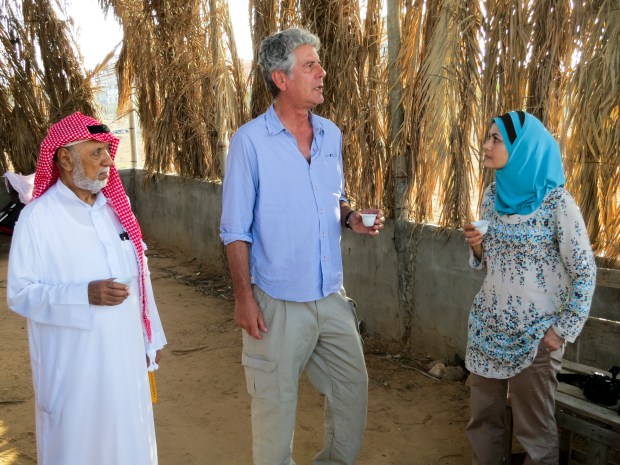Synopsis: Bourdain travels to Jerusalem, where he tries to make sense of the Israeli-Palestinian conflict. He meets Israeli-British chef Yotam Ottolenghi, theater director Abed Abusrour, and cookbook author Laila El-Haddad. He tries fatit ’ajir, a dish made of baby watermelon and unleavened bread, and maqluba, a traditional Palestinian dish made of layers of fried eggplant. In the West Bank Bourdain meets Betty Saadeh and Mona Ennab, the first all-female racing team in the Middle East.
On religion:
“I am instinctively hostile to any kind of devotion. Certainty is my enemy. I’m all about doubt— questioning oneself and the nature of reality constantly.”
On the feeling of peace at the Jewish Arab–owned restaurant Majda:
“You could almost believe for a minute or two that some kind of peace, some kind of reconciliation, meeting of the minds, sanity is possible after you visit Majda. It feels like an alternate universe for a number of reasons.”
On the cuisine in Gaza:
“All the food I’ve had so far in Gaza has been very different than anything else I’ve had in the Arab world—different flavor spectrum.”
On hospitality in the Muslim world:
“Many, if not most, of these guys are not too sympathetic to my country or my ethnicity, I’m guessing. But there’s that hospitality thing. Anywhere you go in the Muslim world it seems, no matter what, you feed your guests and do your best to make them feel at home.”

Guests weigh in:
Yotam Ottolenghi [on the origins of falafel]: “The one thing that is very clear in this part of the world—Palestine, Lebanon, Syria—it’s been cooked for many, many generations. There’s actually no answer to it, but the question of food appropriation—who owns the food—you can go on arguing about it forever.”
Bourdain [on the Aida refugee-camp population]: “Six thousand people: Of that number 66 percent are under the age of 18. I don’t care where that is in the world, that’s pretty much a recipe for unruly behavior.”
Abed Abusrour: “Well, yes. Especially when you don’t have any possibilities to evacuate the anger and the stress in a creative way. So after I finished my studies, I came back here and I started using theater as one of the most amazing, powerful, civilized, and nonviolent means to express yourself, to tell your story, to be truthful.”
Laila El-Haddad [on the cultural importance of food in Palestine]: “For me, being from Gaza, being a child of the diaspora, I always thought food was a really interesting way to be able to tell the Palestinian story—being able to discover this lost history, this Palestinian past. Plus, the food is really dang good.”
El-Haddad: “Gaza has three distinctive culinary heritages. Those who hail from villages that were either depopulated or destroyed in 1948—and they constitute about 75 percent of the population of Gaza and they kind of bring with them their own distinct cuisine. That’s very different from the cuisine of Gaza City, which tends to use much more heat, much more chili peppers, from the cuisine of the coast, which is rich with seafood, of course, and a very sophisticated, very urbane cuisine.”